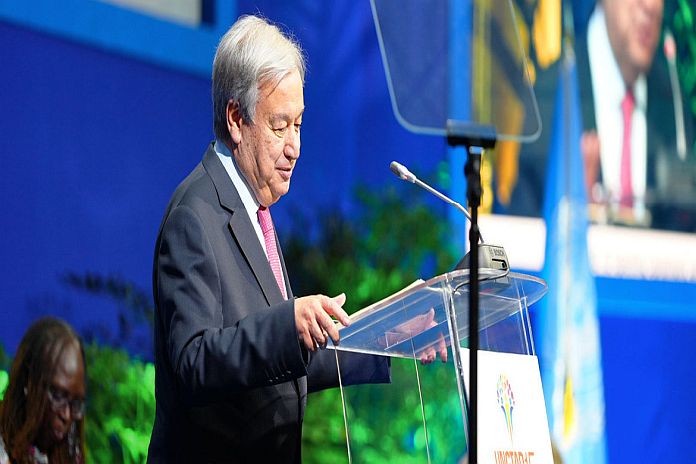BRIDGETOWN, Barbados – Recovery from the COVID-19 pandemic must be sustainable and inclusive, Secretary-General António Guterres said in remarks to a major UN trade conference which opened on Monday in Barbados, unveiling “an urgent four-point debt crisis action plan.”
Warning that uneven recovery is leaving much of the world behind, Mr. Guterres urged greater support for vulnerable nations as they tackle the challenges of debt distress, lack of investment, unfair trade and the climate emergency.
While highlighting the urgent need for vaccine equity now, it is but “the first step in a much longer race”, he said, as the pandemic is putting decades of development progress at risk.
Level the playing field
“We need to turn this around with a bold, sustainable and inclusive global recovery,” Guterres told the latest ministerial conference of the UN trade and development agency, UNCTAD.
“One that benefits the many, rather than the few. One that delivers hope to people — and healing to our planet. And one that levels the playing field for all countries as they support their people during this extraordinary moment in history.”
Countries cannot build back from the pandemic if they are held down by debt, which the UN chief described as “a dagger through the heart of global recovery.”
While welcoming the recent issuance of $650 billion in Special Drawing Rights (SDRs), a type of foreign reserve asset created by the International Monetary Fund (IMF), he appealed for “a quantum leap in support.”
Action against debt
His four-point debt action plan calls for re-allocating unused SDRs to vulnerable countries, including middle-income nations, and for the G20 wealthy economies to extend their debt suspension initiative, established in May 2020, through next year.
The secretary-general also reiterated his call to reform “the international debt architecture”, particularly for middle-income countries, to examine innovative measures such as debt swaps, buybacks and exchanges.
“Fourth and finally, we need private finance to help fill the gap,” he said. “It is deeply unfair that rich countries can borrow cheaply and spend their way to recovery, while low and middle-income countries struggle to keep their economies afloat.”
‘People above profits’
With the pandemic putting development at risk, the secretary-general emphasized that countries must be supported in making “bold investments” in education, social protection, health care and decent work.
“We need to put people above profits, including through fair tax burdens, and ending tax evasion, money laundering, and illicit financial flows,” he said, speaking in French.
In this regard, the G20, the UN and international financial institutions should work with the Organisation for Economic Co-operation and Development (OECD) to push forward in implementing a global framework for corporate taxation so that “taxes benefit people in places where economic activity actually happens. In communities – not distant boardrooms.”
Support fair trade
The world’s poorest countries should also benefit from trade and investment, both of which have been derailed by the pandemic.
“We need open and fair trade rules, so all countries can compete on a level playing field no matter their position on the development ladder,” said Guterres. “And we also need to help developing countries modernize their infrastructure and trade flows – reducing costs and increasing efficiencies.”
These measures are vital to support countries as they transition to “green” economies, grounded in renewable energy, which also entails modernizing the transport sector, particularly the vital global shipping industry, responsible for some 80 percent of trade.
Climate finance promise
Building a global green economy is the fourth challenge the international community faces, as countries strive to minimize global temperature rise, in line with the Paris Agreement on climate change.
The UN chief again pressed for commitment to achieve carbon neutrality by mid-century through measures such as phasing out subsidies for fossil fuels, Richer countries were also reminded of their decade-old promise to provide $100 billion annually in climate finance to support the developing world.
“For countries like Barbados on the frontlines of the climate crisis, adapting and building resilience is not a luxury — it is an urgent priority,” the secretary-general said, underlining the need to fund adaptation.
“So, today, I repeat my call to donors and multilateral development banks to allocate at least 50 percent of their climate support towards adaptation and resilience.”
The ‘Olympics’ of trade
The UNCTAD ministerial conference, which takes place every four years, is a platform for dialogue on key and emerging issues affecting the global economy.
The UN chief described it is “the Olympics of trade, development, investment, policy and technology discussions”, and the discussions there can help the world to both learn from past mistakes and avoid repeating them.
“We can make progress to ending the inequalities that hinder sustainable growth and prosperity for all,” he said. “And we can recover better together at this extraordinary moment in history.”
A more equal world
Newly appointed UNCTAD secretary-general Rebeca Grynspan, the first woman to head the agency, reminded participants of what they can achieve, for instance, in making trade and logistics more resilient and sustainable, but also in closing the so-called digital divide, promoting investment in developing countries, and fostering more inclusive decision-making.
“If this UN conference on trade and development succeeds, it would not be the first time,” she said, recalling some of UNCTAD’s accomplishments over its nearly 60-year history, which included the proposal to create SDRs.
“Throughout our work, we have contributed to a world that is more aware of its own inequalities. But we need now to use this knowledge to find common ground and agree on planned and urgent solutions to these issues.”





